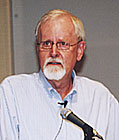 Commemorative Lecture
Commemorative Lecture
"Future Challenges for Asian Food and Agricultural Policy"

- Per Pinstrup-Andersen
-
- H.E.Babcock Professor of Food , Nutrition and Public Policy, DNS, Cornell University
A triple burden of malnutrition (hunger, micronutrient deficiencies, and overweight and obesity) is widespread in Asia. Dramatic reductions in the number of undernourished people have been achieved during the last forty years and it appears that the Millennium Development Goal will be achieved by 2015. At the same time, overweight and obesity is increasing at a rapid rate in a number of Asian countries and micronutrient deficiencies are widespread. Rapid economic growth in many parts of Asia is causing significant dietary changes including increases in the demand for livestock products, fruits and vegetables. These dietary changes are accompanied by increasing net imports of a variety of food and feed items in response to an increasing gap between food production and consumption in Asia. Rapid demand increases for meat in East Asia will bring that region up to the same per capita meat consumption as Latin America by 2020. Almost all of the increases in Asian food production will have to come from increasing yields with area expansions accounting for a very small fraction of the production increase. Except for the price of fish, real food prices are expected to continue to decrease between now and 2020, although the decrease will be less than it has been the last twenty years. A number of future policy challenges are facing Asian food and agriculture, including (1) how to sustain a stable supply of food in a deteriorating environmental situation, including water resource issues caused by urbanization and industrialization, and (2) how to rescue those in poverty who rely on subsistence agriculture and who are suffering from starvation.
In order to resolve these challenges, a variety of actions are required, including (1) to improve agricultural productivity and boost the quality of agricultural products through science and technology, (2) to not merely manage water resources, but ensure comprehensive management of all natural resources, including land and forestry, and (3) to ensure an export market for people in poverty who rely on the agricultural industry.
In particular, in Japan, the following actions are required: (1) to revise policies such as import tariffs, designed to protect domestic industries, thereby enabling other Asian countries to export agricultural products to Japan, (2) to increase development aid to the agricultural sector in Asia, and (3) to actively advance sharing of science and technology with developing countries.Andrew Mason is Professor of Economics, University of Hawaii at Manoa and Senior Fellow at the East-West Center, Honolulu, Hawaii. He is a member of the Center for the Economics and Demography of Aging (CEDA) at the University of California, Berkeley and a member of the Harvard Program on the Global Demography of Aging. He was a Visiting Professor, Institut d’Etudes de Politique de Paris in 1998 and a Visiting Scholar at Massachusetts Institute of Technology in 1983-84. He received his Ph.D. from the University of Michigan in 1975.
His most recent books are Sharing the Wealth: Demographic change and economic transfers between generations, Oxford University Press, co-edited with Georges Tapinos, and Population Growth and Economic Development in East Asia: Challenges Met, Opportunities Seized, Stanford University Press.






